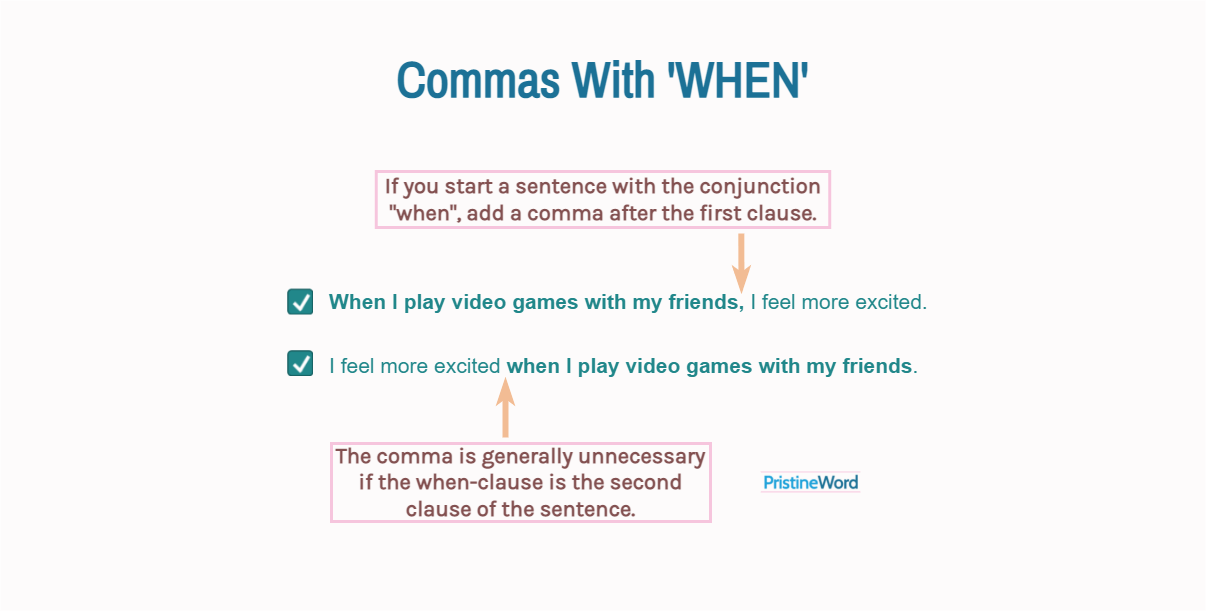If you start a sentence with the conjunction "when", add a comma after the first clause. The comma is generally unnecessary if the when-clause is the second clause of the sentence.
If you start a sentence with the conjunction "when", add a comma after the first clause.
When I play video games with my friends, I feel more excited.
When I play video games with my friends I feel more excited.
The comma is generally unnecessary if the when-clause is the second clause of the sentence.
I feel more romantic when I play the guitar.
I feel more romantic, when I play the guitar.
Contents
1. Starting a Sentence With 'When'
Subordinating conjunctions, such as "when", always join an independent clause and a dependent clause.
When the weather is gloomy, some people feel miserable.
As a general rule, if the when-clause (dependent clause) comes first, we need a comma after it.
When the sky is clear and blue, we go to the beach.
When the sky is clear and blue we go to the beach.
Instead of introducing a clause, we can use "when" to introduce a phrase. Phrases, unlike clauses, do not have a subject and a verb. In this situation, if the introductory phrase is brief (less than five words) and the sentence is clear, the comma is optional.(1)
When in town we go to a fancy restaurant.
2. Starting a sentence with the Independent Clause
Look at this sentence:
I enjoy visiting Buddhist temples when I travel to Japan.
The first clause ("I enjoy visiting Buddhist temples") is the independent or main clause; it expresses a complete thought and can stand alone.
If the when-clause follows the main clause, the comma before "when" is generally unnecessary.
You exchange incoming oxygen with outgoing carbon dioxide when you take a deep breath.
3. Parenthetic Expressions Starting With 'When'
We can also use "when" to introduce a parenthetic phrase or clause; that is, a part of a sentence that does not define or limit. Parenthetic expressions just provide additional information, which can be safely omitted without changing the meaning of the sentence.
In 1879, when Albert Einstein was born, Russia and the United Kingdom signed the Treaty of Gandamak.
Note that the clause "when Albert Einstein was born" is parenthetic; it can be easily omitted without changing the meaning of the sentence. Parenthetic clauses should be placed between commas.
In 1962, when Marilyn Monroe died, the Soviet Union began to install nuclear missiles in Cuba.
In 1962 when Marilyn Monroe died the Soviet Union began to install nuclear missiles in Cuba.
4. More Examples
- I experience heartburn when eating spicy food.
- When going out with my friends, I enjoy eating pizza.
- Call me when you are ready.
- When you are hungry, you can eat healthy food (e.g., salads, fruits, or smoothies).
- You never know when you may need to call her.
- When stock prices go up, interest rates go down.
- Will Rebecca stop me when I kiss her?
- There were many people when I arrived at the party.
- When you buy a property in Spain, you will have to pay some taxes.
5. Conclusion
Follow these simple guidelines to decide whether to use commas in a "when" sentence:
- If a sentence starts with a when-clause, include a comma after the first clause.
- If the when-clause comes at the end of the sentence, a comma is often unnecessary.
6. References
(1) Kaufman, Lester; Straus, Jane. The Blue Book of Grammar and Punctuation. Chapter 2 (punctuation).

